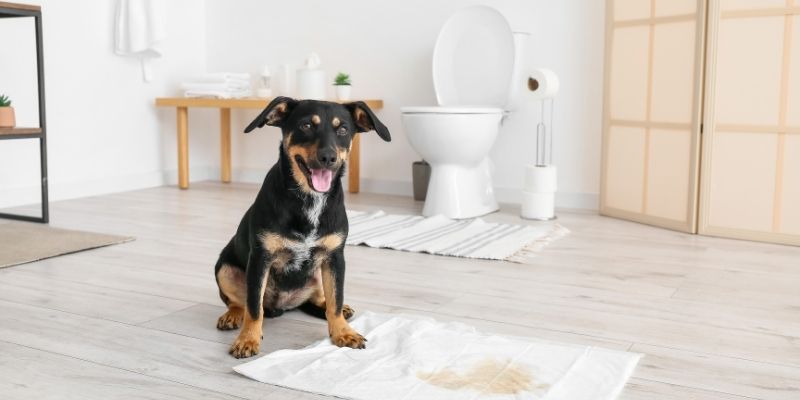Frequent urination in dogs is classified into two types: an insatiable desire to urinate, which can indicate other disorders, and incontinence, which is more of a lack of awareness of urine. While incontinence can be caused by different disorders, it can also be a symptom of other issues in the body, such as bladder infections, urethral blockage, or even natural aging. If you find your pet urinating in unusual places or at unusual times, it could be due to incontinence.
Do you have a specific question about antibiotics causing frequent urination in dogs? Then use the table of contents below to jump to the most relevant section. And you can always go back by clicking on the black arrow in the right bottom corner of the page. Also, please note that some of the links in this article may be affiliate links. For more details, check the Disclosure section at the bottom of the page.
Here's what we'll cover:
Causes of frequent urination in dogs
There are several main causes of urine incontinence:
- Ectopic ureters induce urinary incontinence: An ectopic ureter is a urethral hole that is not normal. This is most common in female dogs, with the following breeds being most vulnerable: Miniature Poodle, Collie, Welsh Corgi, Fox Wire-haired Fox Terrier, West Highland White Terrier, Golden Retriever, Labrador Retriever, Siberian Husky, Newfoundland, and English Bulldog Urine tract infections are common in those who have this type of urinary incontinence.
- Urinary incontinence caused by decreased urethral closure pressure: Because this is usually the result of neurological issues, a comprehensive neurological assessment is required. The occurrence, duration, and intensity of urine incontinence will vary.
- Bladder infection: While a bladder infection is not real incontinence (the pet is aware of peeing), it manifests similarly. A bladder infection either increases your pet’s desire to urinate or scars the bladder (when left untreated for an extended time) so that it cannot contain urine. This may result in urine in abnormal areas or frequent urination.
- Urethral obstruction: If the dog cannot completely empty their bladder due to the blockage, the resulting pressure may force leaks.
- Hormone-responsive incontinence is more prevalent in female dogs, although it can also occur in male neutered dogs. This happens after the pet has been neutered and can occur months or years later. It is more common in larger dog breeds.
- Age-related incontinence is a more natural type of incontinence that occurs due to normal aging. This can be due to muscle weakness or an overall vulnerability to sickness than younger pets do not have. Senior pets may also get senile and be unaware that they are urinating.
Medications that can cause urinary incontinence
Urinary incontinence, or loss of bladder control, can be caused by various medical illnesses and physical changes, including childbirth, dietary changes, infection, prostate troubles, menopause, and neurological abnormalities. However, several drugs can cause urinary incontinence and frequent urination in dogs.
Some medications are diuretics, which induce the kidney to produce more pee, resulting in frequent urination and an overactive bladder.
Do antibiotics increase urination in dogs?
Apart from the potential diuretic effect, one of the adverse effects of antibiotics in dogs is increased thirst. At the very least, your dog may wish to try to get rid of the drug’s disagreeable taste.
If the dog is consuming more water than usual, it is natural to urinate more frequently. The dog’s desire to go outside during the night, sometimes twice or three times, is the most visible indicator. Don’t make the dog contain his bladder; let him go outside if he wants.
Dogs left at home alone throughout the day while everyone is gone will need to go outside more frequently, so provisions must be made to allow this. If you cannot return home, perhaps a neighbor can assist you.
Housetraining mishaps are prevalent as a result of an increased desire to urinate. It is critical not to penalize the dog; not only is this poor dog training, but he also has less control at this time. After all, his bladder is refilling faster than usual. Instead, simply ensure that he gets outside twice as often as he regularly does. It doesn’t take long after the dog is off the antibiotics for his thirst to subside and his urinating habits return to normal.
Thanks for the blog graphics: Canva.com

Thanks for the blog graphics: Canva.com
Doghint.com is a participant of several affiliate programs. The list includes (but not limited to) the following: VigLink, Refersion, ShareASale, and Amazon Services LLC Associates Program, an affiliate advertising program designed to provide a mean for us to earn fees by linking to Amazon.com and affiliated sites. Doghint.com does not intend to provide veterinary advice. All published articles are meant for informational purposes only and not substitute the professional veterinary consultation.


